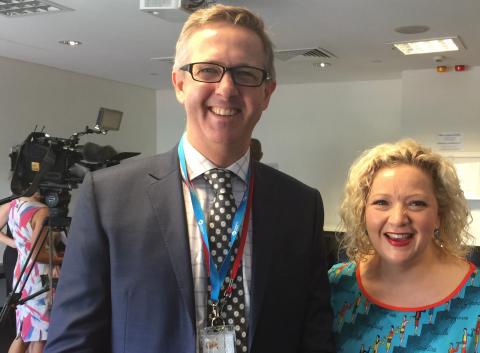
A world-leading project aiming to improve control of superbugs among high-risk hospital patients is one of five new Melbourne Genomics projects that will see more patients in Victoria access genomic sequencing in healthcare.
Victorian Health Minister, The Hon Jill Hennessy, today announced the five disease areas in which selected patients will receive genomic sequencing through the Melbourne Genomics Health Alliance during 2017 to 2019. The announcement was made at Austin Health, which is leading two of the five cross-institution projects.
Genomic sequencing will be made available to patients with specific medical conditions over the next two years, alongside their usual care – to assess the usefulness of genomics in medical practice.
Patients at The Royal Melbourne Hospital, The Royal Children’s Hospital, The Peter MacCallum Cancer Centre, Austin Health and Monash Health will be invited to participate, to determine whether genomic sequencing can provide:
- better identification and control of superbugs among Victoria’s most vulnerable patients
- better understanding of the cause of a patient’s bone marrow failure, enabling more personalised medical care and improved identification of relatives at risk
- improved diagnosis and care of adolescent and adult patients with complex neurological and neurodegenerative disease
- better understanding of the cause of multiple abnormalities babies who die in utero or early in infancy
- more accurate diagnosis and improved patient care for genetic kidney disease
“The superbugs team is incredibly excited by the potential of rapid bacterial genomic sequencing to more quickly and accurately identify superbugs and how they are spreading,” said Dr Norelle Sherry, an infectious diseases physician at Austin Health and clinical co-leader of the project. “We are building a world-leading model for a real-time, state-wide, genomics-based superbug tracking system that will improve protection for all Victorians.”
“Genomic sequencing's application in the fight against superbugs is yet another revolutionary step forward, with the power to identify potential superbug outbreaks before they become a real threat to the most vulnerable of patients,” said Minister Hennessy.
"Melbourne Genomics Health Alliance has had national and international impact in demonstrating how genomic sequencing can be delivered within healthcare, and how it can benefit patients through quicker, more accurate diagnosis, often reducing the need for more invasive or expensive testing,” said Melbourne Genomics’ Executive Director, Associate Professor Clara Gaff.
“These new projects will give an even clearer perspective on how genomics can improve patient care – from infancy to old age. By the end of 2019, we will understand the impact of genomics on diagnosis and care across 16 disease areas. And Victorians will benefit from the systems and the professional knowledge we are building to support genomic medicine in practice.”
Click here for more information on Melbourne Genomics' projects.
[Image: Professor Ben Howden, co-leader of the Controlling Superbugs project, with Minister Jill Hennessy at the announcement event.]
